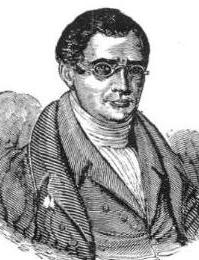Sarah Maria Cornell
James abandoned the family when Cornell was a baby, forcing her mother to give up her older sister and brother to relatives as she was financially unable to care for three children.
In the years that followed, she would move often and work at various mills in Rhode Island and Connecticut, including stints in North Providence, Jewett City, Slatersville.
It was at a Methodist Camp Meeting in Thompson, Connecticut at the end of August 1832 that Cornell once again crossed paths with Reverend Avery.
On the morning of December 21, 1832, Cornell's body was found by farmer John Durfee quickly identified by the minister.
[3] Later discovered among her personal effects at the Hathaway residence was a note written by Cornell and dated the same day as her death: "If I should be missing, enquire of the Rev.
"[4]Other suspicious and incriminating letters were also discovered, as well as a conversation she had had with a doctor indicating the married Avery was the father of her unborn child.
This jury overruled the earlier finding of suicide and accused Ephraim Kingsbury Avery, a married Methodist minister, as the "principal or accessory" in her death.
[citation needed] Cornell's pregnancy led another Methodist minister to reject the responsibility of burying her the second time (she already once been exhumed for autopsy).
That night, in Fall River, money was raised and two committees pledged to assist the officials of Tiverton with the murder investigation.
In Bristol, an inquest was convened, in which two Justices of the Peace found there to be insufficient evidence to try Avery for the crime of murder.
The deputy sheriff of Fall River, Harvey Harnden, obtained from a Rhode Island superior court judge a warrant for Avery's arrest.
The six lawyers for the defense, hired by the Methodist Church, were led by former United States Senator and New Hampshire Attorney General Jeremiah Mason.
Under Rhode Island law at the time, defendants in capital cases were not permitted to offer testimony in their own defense, so Avery did not get the opportunity to speak.
The defense characterized her as "utterly abandoned, unprincipled, profligate," and brought forth many witnesses to testify to her promiscuity, suicidal ideation and mental instability.
The prosecution largely attempted to portray the Methodist clergy as a dangerous, almost secret society, willing to defend their minister and the good name of their church at any cost.
[4] A medical debate centered around whether the unborn child was in fact conceived in August, although Puritan standards of propriety regarding the female body sometimes made it difficult to elicit factual information.
The minister was set free and returned to his position in the Methodist Church, but the public opinion was that Avery had been wrongfully acquitted.
To ease tensions, the church's New England Conference convened a trial of its own, chaired by Wilbur Fisk, in which Avery was again acquitted.
The story of Cornell's death and the ensuing trial were the subject of the 1833 book Fall River: An Authentic Narrative by Catharine Williams and the 2025 book The Sinners All Bow by Kate Winkler Dawson, as well as the 2001 academic paper 'The Scarlet Letter' and the 1833 Murder Trial of the Reverend Ephraim Avery by Kristin Boudreau.


